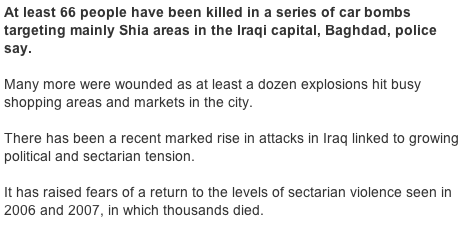Various Written Media Types and Their Expectations of Readers
I am struck by the fact that modern news articles from CNN or BBC are no more than bullet points. They are literally a collection of one to two sentence statements, and the reasoning is clear: anything more and it won’t be read.
Isn’t this a damning conviction of modern news readers? Are we so shallow or unable to focus that asking us to read a paragraph would lead to fewer readers?
Clearly the answer is yes. Here’s a clip from BBC I just picked up:

This is basically a bullet list, sans bullets.
Other media types
So what about other media types? Let’s take a look.
Economist: I just visited that site and clicked a link and found this story. It has between one and three sentences, which looks more like BBC than I would have imagined
WSJ: 1-3 sentences
NYT: 1-3 sentences
Scientific journals: full paragraphs
My own style
Sadly, I’ve noticed my own writing trending toward this as well. In both my writing online as well as in email at work I have been breaking out my paragraphs at around two short sentences–perhaps three.
For email, however, I see this as ok, but I think this contradicts my point. Or at least justifies why all the media forms above are doing it as well.
Basically, I break up my thoughts in email to ensure that they are read. The moment you go to a full paragraph in an email, where the recipients are likely WAY behind on everything–including reading email–you’re reducing drastically the chances that your email will be read.
I do the same thing with my writing online.
To me, breaking up the flow of a message in this way makes the tempo extremely approachable. This is something I learned from Hitchens–the concept of long sentences punctuated by short ones–and I think breaking up your prose in this way is more likely to be parsed correctly.
Conclusions and questions
I’ve learned a lot in this post. It was supposed to be about how modern readers are lazy, but instead it turned into a potential realization that this new structure is superior.
But is that true? When should we stick with bulky paragraphs? When is that the right thing to do?
Get a weekly breakdown of what's happening in security and tech—and why it matters.
If the goal is to communicate, then is it not best to use the method that does that most efficiently? But there’s a counter-point there: why then use proper grammar and spelling? You get the meaning if it’s wrong, so why do it right?
I suppose the concept of the paragraph as I learned it was to group similar points into a paragraph, and to move on to another one when you had a new point.
The key there is that it introduces a burden to the reader. A reader sees a massive paragraph and says, "Well, damn, if it was important they would have summarized for me."
Which takes me back to laziness. This is why lofty writing is done in a small font using large paragraphs of obscurantist prose. They WANT people to not read it. Or, more accurately, they want those who do read it to receive a prize and feel good about themselves.
Not just good about themselves, actually–superior.
So perhaps bulleted prose (even sans bullets) is the most efficient for conveying information, and those who use it are substituting their ability to be respected for their ability to be read by many.
This also isn’t quite right, because if done well you can be respected for your ideas your communicating–not just how you communicate them. My writing for example, isn’t overly elaborate; I’m focusing instead on the content, which I believe to be a good thing.
Krugman at the NYT is the same way; he writes much like I do–albeit better (or at least more consistently better)–and he focuses on getting out his populist message vs. being considered a great writer.
I think much of what writers do–especially philosophers–is attempt to use obscurity as a quality lens. They obscure or dress their ideas in elaborate prose in the hope that small nuggets of goodness will become full meals once discovered. But perhaps this is because by the time a reader gets there he is likely to be quite hungry from all the work.